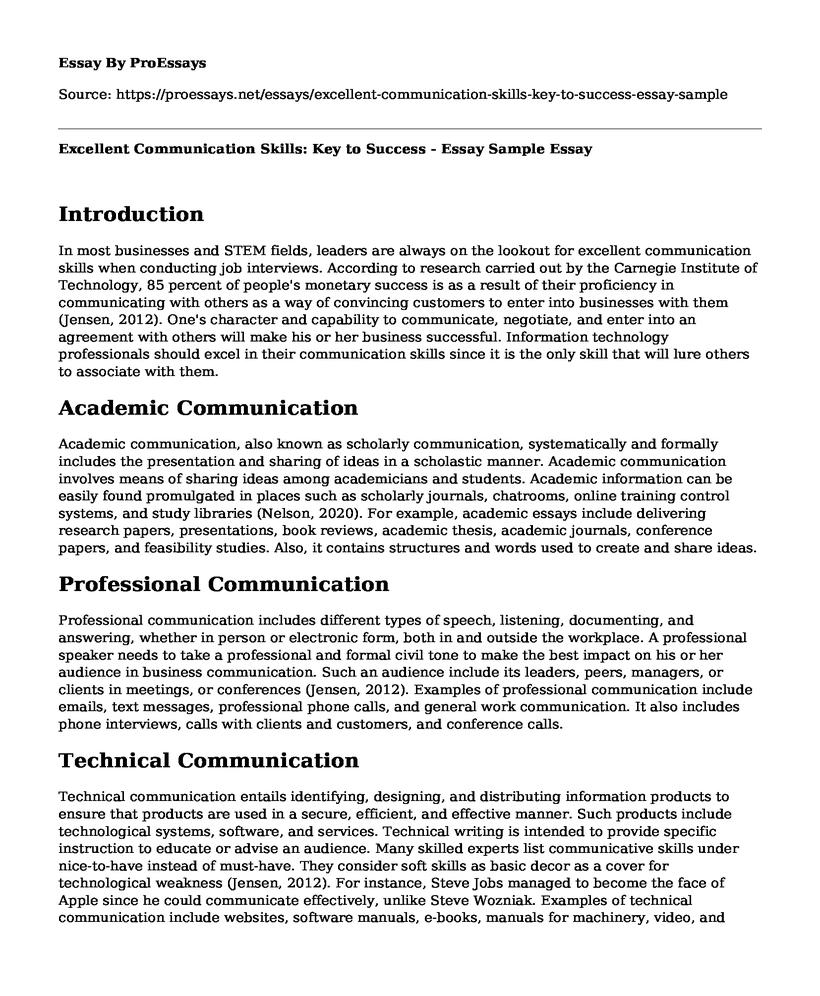Introduction
In most businesses and STEM fields, leaders are always on the lookout for excellent communication skills when conducting job interviews. According to research carried out by the Carnegie Institute of Technology, 85 percent of people's monetary success is as a result of their proficiency in communicating with others as a way of convincing customers to enter into businesses with them (Jensen, 2012). One's character and capability to communicate, negotiate, and enter into an agreement with others will make his or her business successful. Information technology professionals should excel in their communication skills since it is the only skill that will lure others to associate with them.
Academic Communication
Academic communication, also known as scholarly communication, systematically and formally includes the presentation and sharing of ideas in a scholastic manner. Academic communication involves means of sharing ideas among academicians and students. Academic information can be easily found promulgated in places such as scholarly journals, chatrooms, online training control systems, and study libraries (Nelson, 2020). For example, academic essays include delivering research papers, presentations, book reviews, academic thesis, academic journals, conference papers, and feasibility studies. Also, it contains structures and words used to create and share ideas.
Professional Communication
Professional communication includes different types of speech, listening, documenting, and answering, whether in person or electronic form, both in and outside the workplace. A professional speaker needs to take a professional and formal civil tone to make the best impact on his or her audience in business communication. Such an audience include its leaders, peers, managers, or clients in meetings, or conferences (Jensen, 2012). Examples of professional communication include emails, text messages, professional phone calls, and general work communication. It also includes phone interviews, calls with clients and customers, and conference calls.
Technical Communication
Technical communication entails identifying, designing, and distributing information products to ensure that products are used in a secure, efficient, and effective manner. Such products include technological systems, software, and services. Technical writing is intended to provide specific instruction to educate or advise an audience. Many skilled experts list communicative skills under nice-to-have instead of must-have. They consider soft skills as basic decor as a cover for technological weakness (Jensen, 2012). For instance, Steve Jobs managed to become the face of Apple since he could communicate effectively, unlike Steve Wozniak. Examples of technical communication include websites, software manuals, e-books, manuals for machinery, video, and audio, and consumer electronics, printed materials, social media, and brochures.
Importance of Academic, Professional, And Technical Communication
The communication unites people by bringing them closer together. Communication is a crucial management feature that is closely linked to all other management functions. The knowledge and perception between individuals and groups are bridged (Nelson, 2020). Good communication skills are essential because they enable people to better and faster understand information. In contrast, poor communication skills result in anger and misunderstandings between people, which later leads to frustrations. Communication thus allows people to better understand others by eliminating incomprehension and clarifying thoughts and phrases as people are educated.
Conclusion
Conclusively, the ability to communicate well is the most crucial skill for a STEM professional to learn since it builds trust, creates better relationships, provides clarity and direction, increases engagement, promotes team building, and resolving problems. For example, the interaction between different persons and departments in an organization encourages knowledge and comprehension through different media, through all channels and networks. This sharing of information is crucial for the productivity of managers and decision-making in general, as managers of different departments, staff, workers, and trade union leaders must have contact with them.
References
Jensen, K. (2012, April 12). Intelligence is overrated: What you really need to succeed. Forbes. Retrieved from https://www.forbes.com/sites/keldjensen/2012/04/12/intelligence-is-overrated-what-you-really-need-to-succeed/#563997cab6d2
Nelson, B. (n.d.). (2020). Three billionaires reveal the underrated skill you really need to succeed (and it's not intelligence). Reader's Digest. Retrieved from https://www.rd.com/advice/work-career/secret-to-success-billionaires/
Cite this page
Excellent Communication Skills: Key to Success - Essay Sample. (2023, Apr 21). Retrieved from https://proessays.net/essays/excellent-communication-skills-key-to-success-essay-sample
If you are the original author of this essay and no longer wish to have it published on the ProEssays website, please click below to request its removal:
- Expansion of a Business
- Procurement and Contract Negotiation Essay
- Ethical Issues Essay Example
- Immigrant Multigenerational Hispanic Families Essay
- Essay Sample on Adoption: International vs Domestic
- Research Paper Example on Photography: A Powerful Tool for Communicating the Truth
- Essay on Nurturing Emotional Resilience: A Parent's Guide to Addressing and Preventing Drug Abuse in Youth







